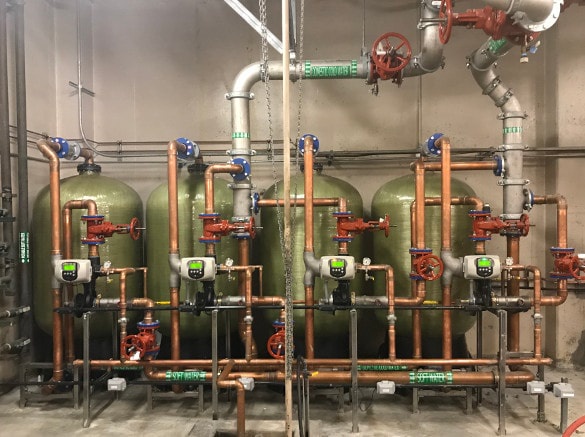Hard water – it's a nuisance that plagues businesses across industries. From leaving unsightly scale buildup on equipment to reducing cleaning efficiency, hard water can have a significant impact on your bottom line. But there's a solution: commercial water softeners. These workhorses quietly transform hard water into soft water, delivering a multitude of benefits that can improve your operations.
Understanding Hard Water
Before exploring water softeners, let's understand the culprit – hard water. Hard water contains a high concentration of dissolved minerals, primarily calcium and magnesium. While these minerals are not harmful to human health, they can wreak havoc on your plumbing and equipment.
The minerals in hard water readily bind to surfaces, forming a chalky white deposit called scale. This scale buildup can cause numerous problems, including:
- Reduced efficiency: Scale buildup in boilers, heat exchangers, and pipes reduces heat transfer, forcing equipment to work harder and use more energy.
- Shorter lifespan: Scale buildup can clog pipes, valves, and other components, leading to premature equipment failure.
- Increased maintenance: Hard water necessitates more frequent cleaning and maintenance to remove scale buildup.
- Poor cleaning: Soaps and detergents have a difficult time lathering in hard water, leading to ineffective cleaning and rinsing. This can be a major concern in industries like hospitality, food service, and healthcare.
The Magic of Commercial Water Softeners
Commercial water softeners address these challenges head-on by employing a clever process called ion exchange. Here's a breakdown of how it works:
- Resin Tank: The heart of the water softener is the resin tank filled with millions of tiny resin beads. These beads are like tiny magnets, specifically designed to attract and hold calcium and magnesium ions.
- Brine Tank: Another tank holds a brine solution, typically composed of salt (sodium chloride) or potassium chloride.
- Ion Exchange Process: Hard water enters the softener tank and flows through the bed of resin beads. As the water passes through, the calcium and magnesium ions in the water are attracted to the resin beads and swap places with sodium or potassium ions already present on the beads. This effectively removes the hardness-causing minerals from the water.
- Regeneration: Over time, the resin beads become saturated with calcium and magnesium ions. To maintain their effectiveness, the softener needs to regenerate. During regeneration, the brine solution from the separate tank washes over the resin beads, flushing out the captured hardness minerals and replenishing the resin with sodium or potassium ions. The wastewater containing the removed minerals is then discharged.
The Benefits of Soft Water: Why Commercial Water Softeners Matter
By transforming hard water into soft water, commercial water softeners deliver a range of advantages for businesses:
- Improved Efficiency: Soft water promotes better heat transfer in boilers and heat exchangers, leading to increased efficiency and reduced energy costs.
- Extended Equipment Lifespan: By preventing scale buildup, soft water helps extend the life of plumbing fixtures, boilers, dishwashers, laundry machines, and other equipment.
- Reduced Maintenance Costs: With less scale buildup, the need for frequent cleaning and maintenance is significantly reduced, saving you time and money.
- Enhanced Cleaning: Soft water allows soaps and detergents to lather more effectively, resulting in superior cleaning and rinsing. This is particularly beneficial in industries like hospitality, food service, and healthcare where hygiene is paramount.
- Improved Aesthetics: Soft water helps prevent the formation of unsightly soap scum and hard water stains on surfaces, making it easier to maintain a clean and professional appearance.
Choosing the Right Commercial Water Softener
With a variety of commercial water softeners available, selecting the right one for your business requires careful consideration. Here are some key factors to keep in mind:
- Water Hardness: The level of hardness in your water supply will determine the size and capacity of the water softener you need. A water test can be conducted to determine the hardness level.
- Water Flow Rate: Consider the peak water flow rate required for your business. The softener should be able to handle the maximum amount of water your establishment uses at any given time.
- Type of Regeneration: Water softeners offer different regeneration cycles, including timer-based and demand-initiated. Choose a regeneration cycle that best suits your water usage patterns.
- Salt or Potassium: Most water softeners use sodium chloride for regeneration. However, if you're concerned about sodium intake (relevant for food service businesses), potassium-based softeners are an alternative.
- Reputation and Warranty: Opt for a water softener from a reputable brand known for its quality and reliability. Look for a unit with a comprehensive warranty to ensure peace of mind.
- Professional Installation and Maintenance: While some water softeners are DIY-friendly, for complex systems, it's best to rely on a qualified water treatment professional for installation and maintenance. They can ensure the system is properly sized, configured, and operating efficiently.
Beyond Water Softeners: Additional Water Treatment Solutions
While commercial water softeners excel at tackling hardness, some businesses may require additional water treatment solutions depending on their specific needs. Here are a few examples:
- Reverse Osmosis Systems: For applications requiring exceptionally pure water, reverse osmosis (RO) systems are ideal. RO systems remove a wider range of contaminants, including dissolved minerals, salts, and even bacteria and viruses.
- Filtration Systems: For specific contaminants like iron, chlorine, or taste and odor issues, various filtration systems can be employed. These systems often use specialized media or membranes to target specific impurities.
Conclusion
Hard water can be a silent drain on your business, impacting everything from equipment efficiency to cleaning effectiveness. Commercial water softeners offer a powerful solution, delivering soft water that translates to numerous benefits. By understanding how water softeners work, the advantages they offer, and the factors to consider when choosing one, you can make an informed decision and reap the rewards of soft water for your business.


No comments yet